In today’s digital-driven world, businesses must embrace online visibility to attract customers and foster growth. Local SEO (Search Engine Optimization) is one of the most powerful tools available for small and medium-sized businesses to connect with customers in their local area. Local SEO allows businesses to tap into a stream of ready-to-buy customers who are actively searching for products or services nearby. If your business is not yet focusing on local SEO, you’re missing out on a significant opportunity for growth and market share.
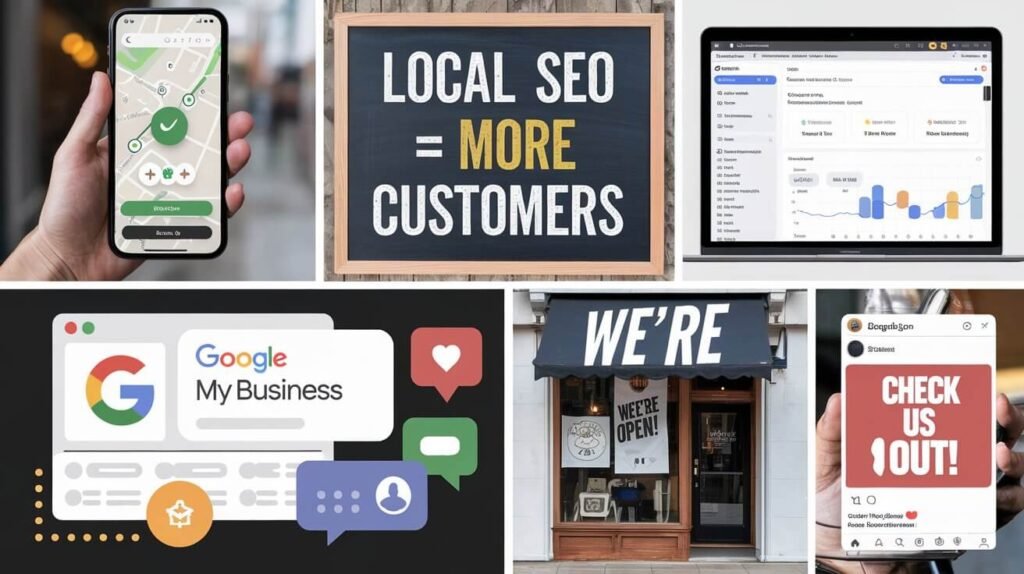
This comprehensive guide will dive deep into what local SEO is, how it works, and the significant benefits it brings to your business. We’ll also explore some advanced techniques and share valuable tips to help you make the most out of your local SEO strategy.
What is Local SEO?
Local SEO is a strategy that optimizes your online presence to increase visibility in local search results. Essentially, it helps your business get found by potential customers who are searching for products or services in a specific geographical area. For example, if someone searches for “best pizza place near me” or “plumbers in [city name],” local SEO ensures that your business appears in the relevant search results.
Unlike general SEO, which focuses on boosting your website’s rankings on a broader scale, local SEO targets a specific local audience. This is critical because about 46% of all Google searches are looking for local information, and nearly 88% of mobile local searches result in either a call or a visit to the business within 24 hours. This highlights the importance of local SEO for businesses, especially brick-and-mortar establishments.
How Does Local SEO Work?
Local SEO involves optimizing your website and online presence to be more visible in geographically-related searches. Here’s a closer look at the major elements that influence your local search ranking:
1. Google My Business (GMB) Optimization
Google My Business (GMB) is one of the most important aspects of local SEO. It’s a free tool provided by Google that helps businesses manage their online presence across Google, including Search and Maps. When optimized properly, your GMB listing can improve your chances of appearing in Google’s Local Pack, Local Finder, and organic search rankings.
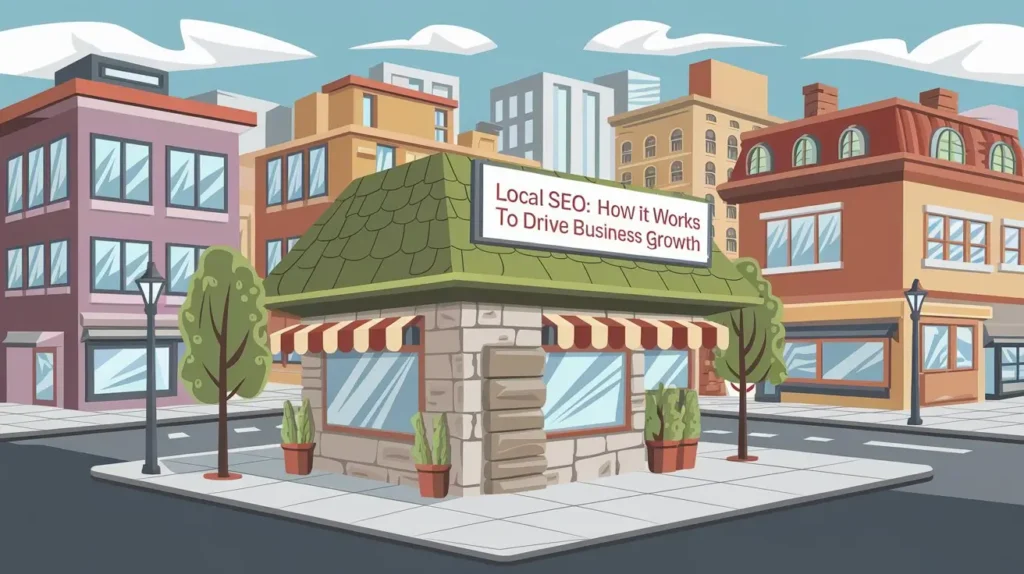
Your GMB profile should include all the necessary information about your business:
- Business Name
- Address
- Phone Number
- Business Hours
- Website URL
- Services Provided
- High-quality Photos
You can also update your profile to reflect seasonal promotions, business events, or any other relevant updates. The more complete your profile is, the better your chances are of ranking in local search results.
2. Local Citations
A citation is any mention of your business’s name, address, and phone number (NAP) on the web. Examples of places where your NAP details might appear include online directories like Yelp, Yellow Pages, or TripAdvisor. Citations help validate the legitimacy of your business to search engines, and having consistent information across different directories can significantly improve your local SEO ranking.
Consistency is key here. Ensure that your NAP information is the same on your website, GMB, and all other directories. Discrepancies can confuse search engines, potentially lowering your ranking.
3. On-Page SEO for Local Search
On-page SEO remains a fundamental part of optimizing your website for local searches. This involves incorporating local keywords throughout your site’s content. For example, if you’re a plumber based in Austin, Texas, your target keyword should reflect this, such as “plumber in Austin” or “Austin plumbing services.”
Some ways to optimize your website for local search include:
- Title tags and meta descriptions: Include your target keywords along with your city or neighborhood.
- URL structure: Make sure your URL reflects your location.
- Internal linking: Link to location-specific pages to enhance local SEO.
- Content: Write blog posts or create landing pages that speak to local issues, events, or needs.
4. Mobile Optimization
Mobile optimization plays a massive role in local SEO. Given that more than half of all web traffic comes from mobile devices, it’s crucial to ensure your website is responsive and easy to navigate on mobile. Google favors mobile-friendly websites, especially for local searches, and poor mobile experiences can lead to higher bounce rates and a lower ranking in search results.
Ensure your website is:
- Fast-loading
- Easy to navigate on smaller screens
- Designed with clickable elements that are spaced appropriately
5. Customer Reviews and Reputation Management
Customer reviews are a significant local SEO ranking factor. Positive reviews not only build trust with potential customers but also signal to search engines that your business is credible and reliable. Google factors in the quantity and quality of reviews when determining local search rankings.
Encourage satisfied customers to leave reviews on Google and other popular platforms such as Yelp and Facebook. Make sure to respond to all reviews, whether they are positive or negative. This shows that you value customer feedback and are actively engaged with your community.
6. Localized Content
Content tailored to your local audience is a must for boosting local SEO efforts. This can include blog posts, case studies, or even videos that focus on local events, partnerships, or testimonials. Engaging with the community and creating localized content not only helps build your authority but also improves your chances of ranking in local searches.
For example, a bakery in Chicago could create a blog post titled “The Best Desserts to Try in Chicago This Fall.” Incorporating local keywords into your content can help drive traffic from customers searching for businesses or services in your area.
7. Backlinks from Local Websites
Building backlinks from other reputable local businesses and organizations is an excellent way to strengthen your local SEO. These backlinks act as a “vote of confidence” from one site to another, indicating to search engines that your business is trusted and legitimate. Local backlinks are particularly valuable because they help reinforce your geographical relevance to search engines.
To build local backlinks, consider:
- Partnering with other local businesses for guest posts or collaborations.
- Sponsoring local events or charities and getting a mention on their website.
- Creating high-quality, shareable content that local blogs or news outlets may want to link to.
8. Schema Markup for Local SEO
Schema markup, also known as structured data, is code that you add to your website to help search engines better understand your content. For local SEO, using schema markup allows you to highlight your NAP information, opening hours, and services, making it easier for search engines to retrieve and display your business details.
By implementing local business schema, you can improve your chances of appearing in local searches, especially in rich snippets and knowledge graphs.
The Benefits of Local SEO for Business Growth
Now that we’ve gone over how local SEO works, let’s explore the tangible benefits it can bring to your business. Here are the top reasons why you should invest in local SEO:
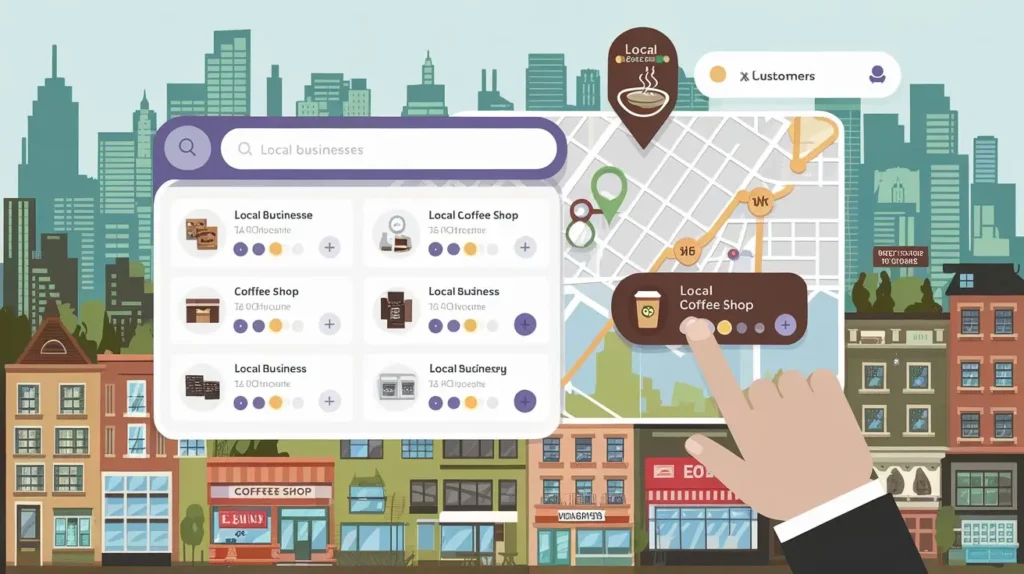
1. Increased Online Visibility
One of the most significant benefits of local SEO is the boost in online visibility it provides. Local SEO strategies help ensure that your business appears at the top of search results for geographically relevant queries. When your business shows up in the local pack (the top three businesses displayed beneath the map in Google search results), it can drive a significant amount of traffic to your site or physical location.
This increased visibility not only leads to more website visits but also more in-person visits, calls, and bookings.
2. Higher Quality Website Traffic
Unlike traditional SEO, which may attract visitors from all over the world, local SEO targets people who are actively searching for services in your area. This means the traffic driven by local SEO is far more qualified. When someone searches for “best coffee shop in New York” or “hair salon near me,” they are already in the mindset of making a purchase or booking a service.
By targeting these local searches, you increase your chances of attracting visitors who are ready to convert into paying customers.
3. Improved Conversion Rates
Local SEO helps improve conversion rates because it reaches people who are already in the decision-making process. Studies show that 78% of location-based mobile searches result in an offline purchase. This makes local SEO a powerful tool for businesses like restaurants, salons, service providers, and retail shops, where customers are likely to visit the physical location after searching online.
Furthermore, customers trust local businesses more when they can find positive reviews, updated business information, and see active community engagement.
4. Cost-Effective Marketing Strategy
Local SEO is one of the most cost-effective ways to market your business. Unlike paid advertising campaigns, which require a continuous budget to maintain visibility, local SEO efforts can have long-lasting effects once implemented correctly. Your business will continue to attract organic traffic without paying per click or per impression, which can save you money in the long term.
By investing time and effort into local SEO, you can generate consistent leads and customers without needing to constantly invest in paid marketing strategies.
5. Compete with Larger Competitors
Local SEO allows small and medium-sized businesses to compete with larger, national brands that may have bigger budgets. Local SEO focuses on niche keywords that are relevant to your community, meaning you can outrank larger companies that are not optimized for local search.
By focusing on local SEO, your business can capture a larger share of the local market, even if a competitor has more resources or brand recognition.
6. Enhanced Local Reputation
Local SEO allows you to build a strong online reputation in your community. When customers search for businesses in their area, they rely on reviews, local mentions, and website content to make their decisions. By actively engaging in review management, creating localized content, and maintaining an updated online presence, you can become a trusted business in your area.
A strong local reputation not only leads to higher rankings but also fosters customer loyalty, encouraging repeat business and referrals.
7. Access to Local Pack Listings
One of the primary goals of local SEO is to appear in the local pack. This is the highly visible section of the search results that features the top three businesses based on location. When your business appears in this section, it stands out to potential customers who are more likely to click on your listing.
Local pack visibility can significantly improve your chances of capturing new customers, driving more traffic to your site or physical location.
8. Increase in Mobile Traffic
With the growing number of mobile users, local SEO is crucial for capturing mobile traffic. Many consumers search for nearby businesses while on the go, making it essential for your business to be visible in these mobile searches. Optimizing for local SEO helps ensure that your business shows up in mobile searches, making it easy for customers to find you when they need you the most.
9. Long-Term Results
Unlike paid advertising, which stops driving traffic as soon as you stop paying, local SEO offers long-term benefits. Once your business is optimized for local search, you will continue to generate organic traffic from local customers over time. This long-term sustainability makes local SEO one of the most effective marketing strategies for small businesses.
10. Better Customer Engagement
Local SEO encourages businesses to actively engage with their customers through reviews, social media, and localized content. Engaging with your customers in these ways not only boosts your online presence but also builds a sense of community and trust.
Responding to customer reviews, sharing local events or news, and maintaining an active online presence creates a loyal customer base that’s more likely to recommend your business to others.
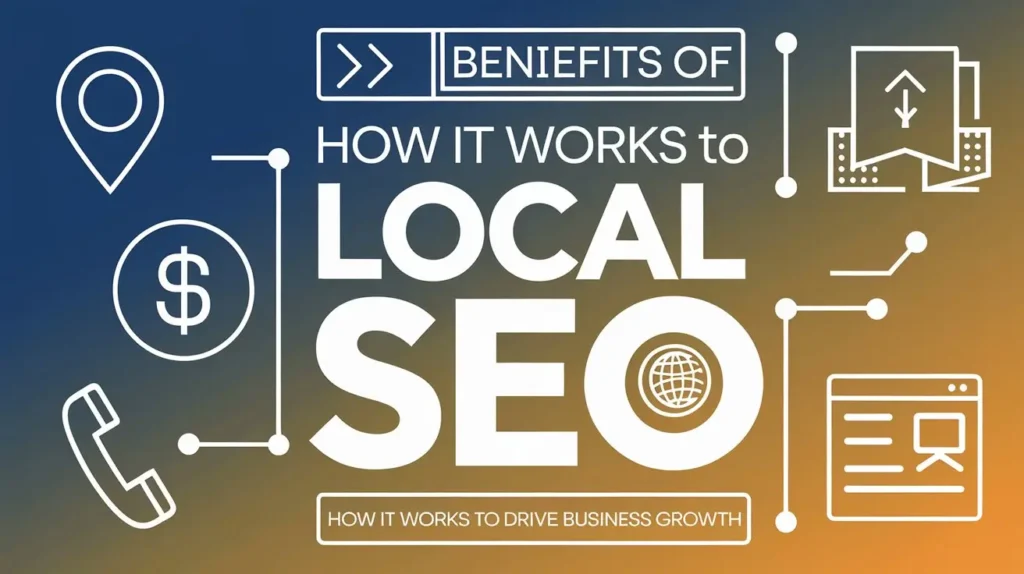
Conclusion: The Power of Local SEO for Business Growth
Local SEO is a game-changer for small and medium-sized businesses looking to grow their customer base and increase visibility in their communities. By optimizing for local search, your business can reach more qualified leads, improve conversion rates, and build long-lasting customer relationships.
If you haven’t yet invested in local SEO, now is the time to start. Whether you own a restaurant, a retail store, or a service-based business, local SEO can provide a competitive edge and help your business thrive in today’s digital landscape. From optimizing your Google My Business profile to creating localized content and managing reviews, each aspect of local SEO plays a crucial role in driving business growth.
Start by taking small steps, like claiming your GMB listing and building local citations, and watch as your business reaps the benefits of increased online visibility, higher conversion rates, and long-term success.
Unlock the potential of local SEO today, and put your business on the map!
FAQs
Local SEO is the process of optimizing your online presence to attract more business from relevant local searches on search engines like Google. It helps your business appear in local search results when customers are looking for products or services near them.
While regular SEO focuses on improving your website’s visibility globally or nationally, local SEO targets searches in a specific geographic area. It helps businesses with physical locations or service areas connect with potential customers in their immediate vicinity.
Google My Business (GMB) is a free tool that allows businesses to manage their online presence across Google Search and Maps. An optimized GMB profile can improve your chances of appearing in Google’s Local Pack and Maps results, significantly enhancing local search visibility.
Local citations are mentions of your business’s name, address, and phone number (NAP) on websites, directories, or social media platforms. Consistent and accurate citations improve your local SEO by validating your business information, which helps search engines rank you higher in local searches.
Customer reviews are a key factor in local SEO ranking. Positive reviews help build trust with potential customers and signal to search engines that your business is credible. More positive reviews can improve your ranking in local search results.
To optimize your website for local SEO, include your business’s name, address, and phone number (NAP) on all relevant pages. Use location-specific keywords in your content, meta descriptions, and titles. Ensure your website is mobile-friendly and loads quickly.
Yes, Local SEO can also benefit service-area businesses (SABs) that may not have a physical storefront. By optimizing your GMB profile and targeting local keywords, service-area businesses can rank in local search results and attract customers from their service areas.
Local SEO is an ongoing process, and results can vary depending on your competition and the effectiveness of your strategies. Generally, you may start seeing noticeable improvements within 3 to 6 months, but continual efforts will yield the best results.
Common mistakes include having inconsistent NAP information across directories, neglecting to optimize your Google My Business profile, not encouraging customer reviews, and ignoring mobile optimization. These mistakes can hurt your local SEO rankings.
You can track your Local SEO performance through tools like Google Analytics, Google Search Console, and your Google My Business Insights. These tools will help you monitor website traffic, local search visibility, and user engagement, giving you insights to refine your strategy.

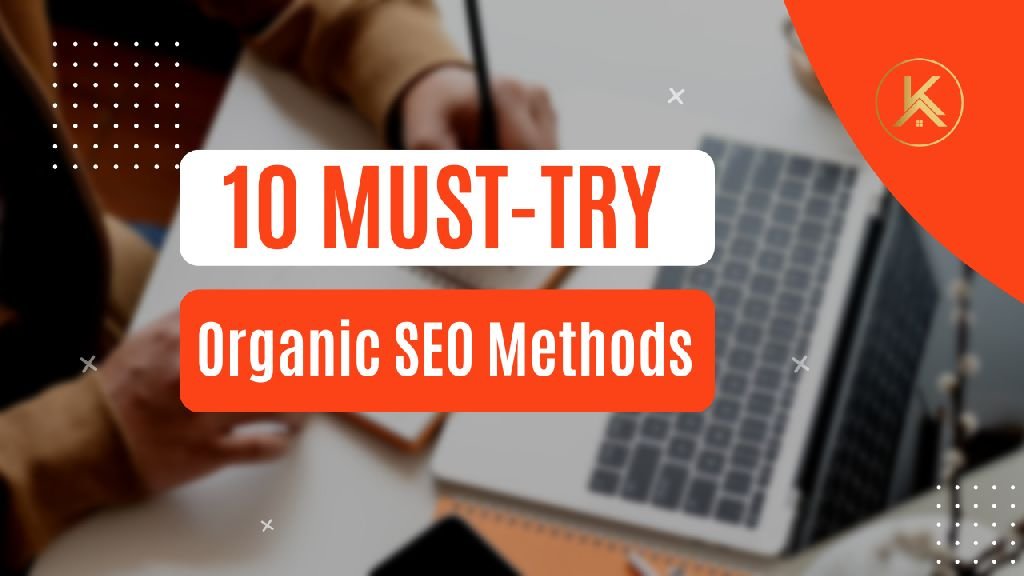
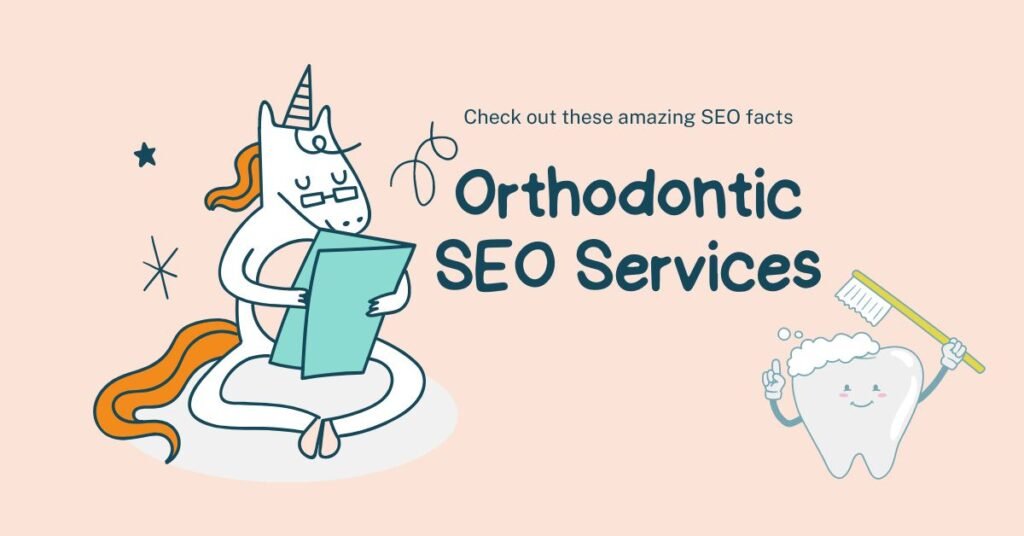
I truly appreciate your technique of writing a blog. I added it to my bookmark site list and will
This was beautiful Admin. Thank you for your reflections.
Pretty! This has been a really wonderful post. Many thanks for providing these details.
Great information shared.. really enjoyed reading this post thank you author for sharing this post .. appreciated
Bahçe sulama tesisatı Teknolojik cihazlarla kaçağı hızlıca bulup onardılar. Üsküdar için büyük bir şans! https://rapagram.com/read-blog/10048
Üsküdar su kaçağı fiyatları Rothenberger cihazı ile Üsküdar’daki su kaçağını dakikalar içinde buldular, çok profesyonel bir ekip. https://jogajog.com.bd/blogs/5500/%C3%9Csk%C3%BCdar-Su-ka%C3%A7ak-tespiti
Üsküdar su tesisat ustası Üsküdar’daki evimde su sızıntısını bulmak için Rothenberger cihazı ve Testo termal kamera kullanıldı, işlem profesyonelce yapıldı. https://www.flexsocialbox.com/read-blog/11454
Uyducu Malatya HD uydu kurulumu Sinyal sorunumuzu anında çözümlediler, gerçekten profesyoneller. https://www.datasheetclub.com/read-blog/1223
Ümraniye süpürge tamirci numarası Cihazımı ertesi gün teslim aldım, harikalar! https://menagerie.media/index.php?link1=read-blog&id=77880